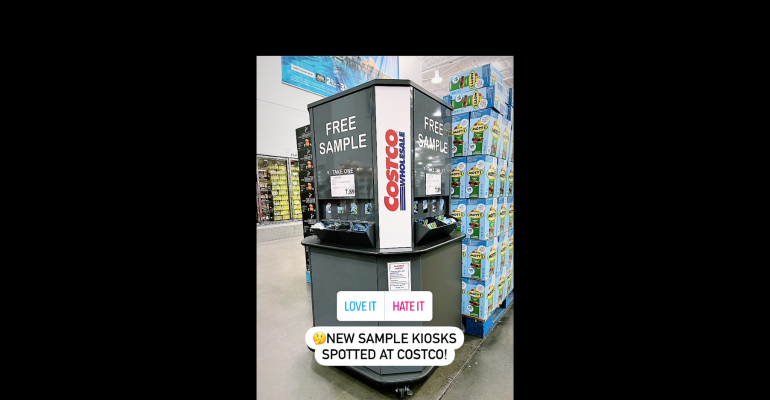But who will stop the vegan bacon from being tossed? In one of the more famous scenes from the show Parks and Recreation, Ron Swanson and April Ludgate are at a supermarket and have the opportunity to sample vegan bacon. Ron takes one, tosses it, then takes another and does the same before being stopped by the sampler. His reasoning? “I want to make sure no one else eats this.” Well, due to staffing issues, Costco might be completely removing the human element from its samples with the introduction of automatic sampling kiosks. Looks like the kiosks will not be serving something hot, nor will they be serving anything with a smile. Bummer. —Bill Wilson
Costco vs Sam’s Club: The U.S. warehouse club industry, which includes Costco, Sam’s Club, and B.J.’s Wholesale is valued at more than $320 billion, according to one estimate. With over 65 million paying members, Costco controls the lion’s share of the market. But Walmart-owned Sam’s Club is now betting that investments in robotics and technology can help it better target budget-conscious shoppers. This video from CNBC talks about how Sam’s Club plans to take the reins from Costco — largely via growing its private label brand and additionally moving forward with its most aggressive expansion in years, opening 30 new clubs and new distribution centers. We’ll keep an eye on it. —Chloe Riley
Some terms to chew on: Shoptalk 2023 is in the books and the event featured quite a few new and novel ideas. There were two terms that I only recently started becoming familiar with that were prominent at several booths and in several sessions. The first is “headless commerce,” which separates the front-end (to use some grocery parlance) of an ecommerce system from services like the catalog, allowing them to operate independently from one another. The other term relatively new to me is “composable commerce,” which takes a modular approach to organizing the ecommerce tech stack (jargon for the computer system). The idea here is that separating the functions of ecommerce into distinct modules allows retailers to change their technology more efficiently and get more control over the customer experience across multiple touch points. They may sound like the same thing, but they’re not: composable commerce is a business practice enabled by headless technology. Perhaps too deep in the weeds now, but the terms may very well be as widely used as AI in a few years. —Ron Margulis
A ‘Thriving’ lead gen opportunity: In March, subscription grocer Thrive Market launched its own podcast called “But Are You Thriving?” Podcasting is the latest effort by retail companies trying to think outside the box. Thrive Market currently has almost 800,000 followers across social media and 1.2 million email subscribers, many of which aren’t annual members. “About 80% of our audience isn’t part of our paid membership program,” says Thrive CMO Amina Pasha. “We expect to see new members coming through this new channel.” The podcast is also being promoted on the Thrive Market homepage banner, in footer links and through dedicated email and SMS notification blasts. A good reminder to consider not just your current shoppers, but also the potential ones. —CR
Cuckoo with coconuts: You put da lime in da coconut … which was handpicked by monkeys in Thailand. The practice, which includes chaining up monkeys and pulling all of their teeth (a toothless primate is a defenseless primate), among other things, is being publicly challenged by PETA. The animal rights activist group really wants the word to hit home, so earlier this week it made a call to action for supporters to dump wheelbarrows full of humanely picked coconuts in front of the headquarters of Whole Foods, which sells coconut milk from Thailand in its stores. No reports on whether the message is going to stop this monkey business. One thing is for sure: No monkeys were harmed. —BW





